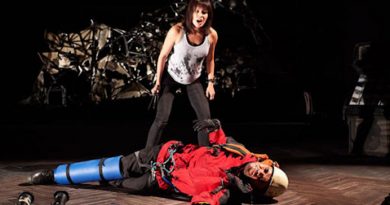Almada Theatre Festival, Portugal, 2024
Dana Rufolo in Portugal at the 41st edition of the Almada Theatre Festival
(Dates 4-18 July 2024)
Because I want to show that attending a theatre festival as a theatre critic is not only about reviewing plays but involves many peripheral experiences and conversations, I’ve written this review in diary form. It’s an experiment, and I hope it’s pleasing.
Dana Rufolo
I wheeled my suitcase from the tarmac into Lisbon airport, the sky blue and cloudless – a radical change from rainy and cold Luxembourg just two and a half air hours away. Within minutes, I was met by Nuno, the Almada Theatre Festival actor (temporarily turned driver) charged with fetching theatre critics from the airport. As we drove in backed-up traffic across the bridge over the Tagus river that separates Almada from Lisbon, I looked up at the statue of Jesus with outstretched arms, Cristo Rei, perched above the stream of cars and facing the blue watery spaces below his mountaintop. A few days later, a Portuguese theatre critic based in Lisbon tells me that the local consensus is the statue resembles a traffic cop!
As we drive on, I delight in hearing about Nuno’s life. Ten years an actor, living in his parents’ home along the coast for economic reasons (foreigners have bought up Lisbon apartments and property and inflated the rental prices), graduate of a professional theatre school and performing regularly, making good money by dubbing, in particular for kids’ animated films (which his nephews and nieces adore). Nuno says, “And yet, after ten years you see I am still a driver! Nuno also says, “When I didn’t like the role I was asked to play, initially I’d refuse it, but now I see this as a part of my growth as an actor. It’s a better use of my time than being a waiter in a café.”
The hotel I am driven to overlooks the expansive Parque Urbano do Pragal, a green patch stretching down a hill that is surrounded by high-rise apartment buildings. I’m obliged to confess to the staff that I don’t use elevators because I’m claustrophobic. They cheerfully assign me a room accessible by stairs on the second floor; someone else can stand impatiently in a metal cage and be pulled up by steel cables to the sixth-floor room that would have been mine!
Critics and performers are driven in an Almada Festival van to the esplanade of the D.António da Costa School which as always is buzzing with people socializing over coffee or food, a bookstand, a bandstand on which a group is performing (“from polyphonic singing from Alentejo in southern Portugal to jazz, passing through Balkan or African rhythms”).
The food always looks and tastes homecooked; tonight the choice is between baked codfish with herbs, a vegan dish of noodles, beans and mushrooms in a herb sauce or meat rolls with mashed potatoes. The meals have been planned by Teresa Gafeira, a famous Portuguese actress, the widow of the beloved Joaquim Benite who founded the festival and ran the eponymous theatre next to the esplanade (now run by Benite’s former assistant Rodrigo Francisco). Gafeira’s primary role is directing the theatre’s year-round plays for children.
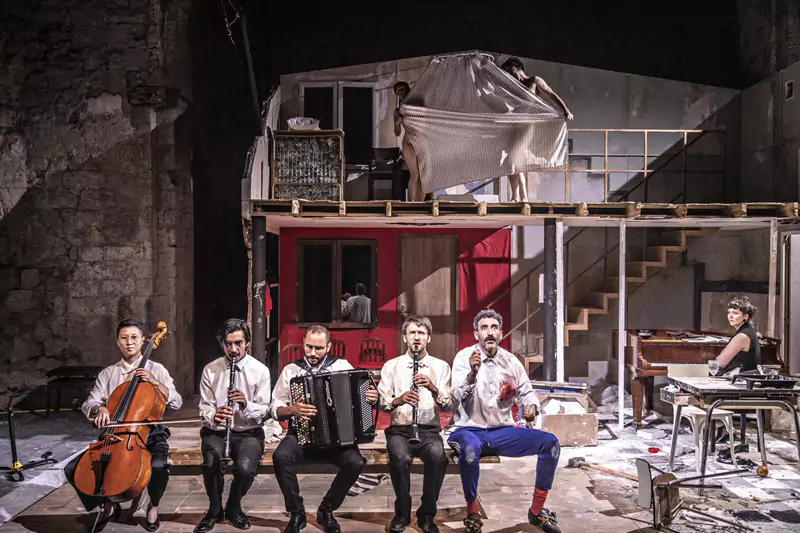
Sans Tambour.
Photo credit: Jean-Louis Fernandez.
All of us are excited to be seeing a production from Peter Brook’s Théâtre des bouffes du Nord in Paris. Sans Tambour, conceived and written by Samuel Achache with musical direction by Florent Hubert, was at the Festival d’Avignon in 2022. It is a musical burlesque piece that leaves a mood rather than a message because the music undercuts the storyline about an unhappily married modern couple and, interestingly, turns it into a sea of emotions that take the sting out of conjugal anger and disappointment.
The play is drenched in the “Lieder” of Robert Schumann. The songs are played in various manners – with accurate tempo, too loudly, chaotically, frenetically – by a small onstage ensemble (cello, flute, clarinet, saxophone, accordion, but no drums – hence the name of the piece, “sans tambour”). The troupe are French; after the show, Miguel Martins who is the Almada festival’s press officer, extolled the Europeanness of the company for their unquestioning fusion of romantic German music and songs with French slapstick, complete with the proverbial French lover.
Sans Tambour is situated in that mental space between music and words which produces a dreamlike effect on us; the timelessness of music is modified by the incisiveness of language and vice versa. The concept of turning music into a force– almost a character – is a hallmark of Achache’s work. A husband and wife virtually destroy their flimsy house by kicking through the walls of Styrofoam bricks or otherwise destroying the building whenever they feel provoked to do so. Although they make love (the orchestra humorously providing the eerily recognizable sound effects) the wife, played by Sarah Picard, finds her husband (Lionel Dray) not refined enough for her. She complains bitterly about her husband’s deficiencies (“I’m talking to you about love, and you dare to talk to me about plumbing?”) A singer stands behind Picard reuttering her words but in song while the instrumentalists accompany them. This technique is repeated often.
So, the wife finds a pianist lover to provide the cultural sophistication she yearns for. Hilarious scenes show them pretending to be on a beach, as he preens and the husband stands silent on a stool holding an axe in his hands on the other side of the stage. The lover hides in the piano and even walks around with the piano hanging like a costume from his shoulders after it falls from the ceiling onto him – that gave rise to roars of laughter in the audience. The two make love behind a semi-circular shower curtain on the exposed second floor; sections from the opera Tristan and Isolde are introduced.
The German romanticism represented by Schumann and Richard Wagner is confounded with a medieval and chivalrous idea of love – based on Achache’s premise that the romantics turned back to the Middle Ages for inspiration. But after all the ruckus, the couple seems to get back together even if their house is in ruins. This just goes to show that modern love cannot be modelled on romantic notions from the past.
Portugal is in a time zone that is one hour behind Luxembourg’s, but I wasn’t the only tired person when quixotic Sans Tambour ended (midnight, Portuguese time), and we critics took the ride back to the hotel in complete silence.
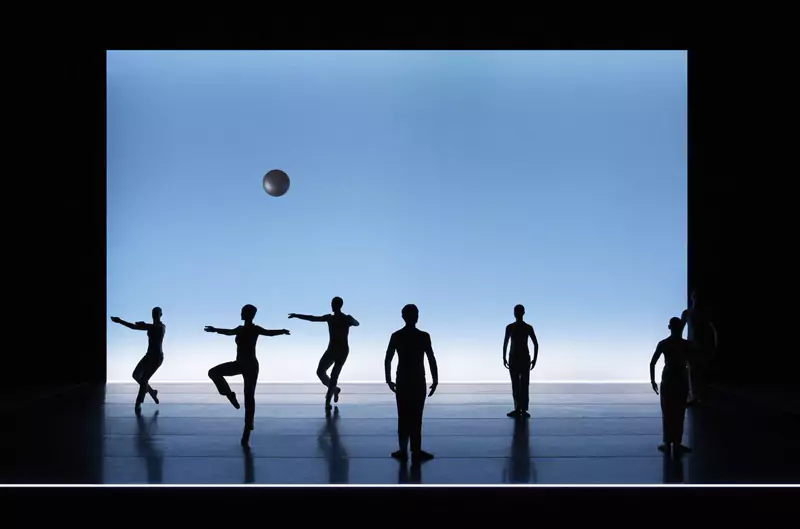
Relative Calm.
Photo credit: Lucie Jansch.
This year, Bob Wilson brought Relative Calm to the festival; it was shown at the important Centro Cultural de Bélem along the Tagus River in an area dense with historical monuments. The piece is a revival of one that Wilson and Lucinda Childs developed in 1981. Devoid of emotion, the dancers repeat movement sequences as if they had internalized the music of Philip Glass while lines, curves or dots flash onto the screen at the back of the stage. In the third part, we see a video of stampeding bulls.
In the first of three parts, the dancers are costumed in what resembles astronaut suits. A steel ball representing a heavenly body circulates slowly along wires suspended just above the dancers’ heads in this first piece of the evening. Later, when the choreography is to Pulcinella by Stravinsky, red costumes contrast with the silver and black and white of the first and third parts which are choreographed to the music of Jon Gibson and John Adams. The sterile regularity of the dance movements and the predictable repetitiveness of the entire evening point to mathematics as the source of inspiration although Wilson himself sees the piece as clockwork. For me, it was a pictorial representation of the universe in a relatively calm moment. No supernovas, no imploding stars, just the orderliness of a self-sufficient ethereal constellation of movements in space. Hypnotic is the word that comes to mind when ascertaining the effect on us audience members of the repetitive movements and regular lines and geometric figures on the rear stage screen.
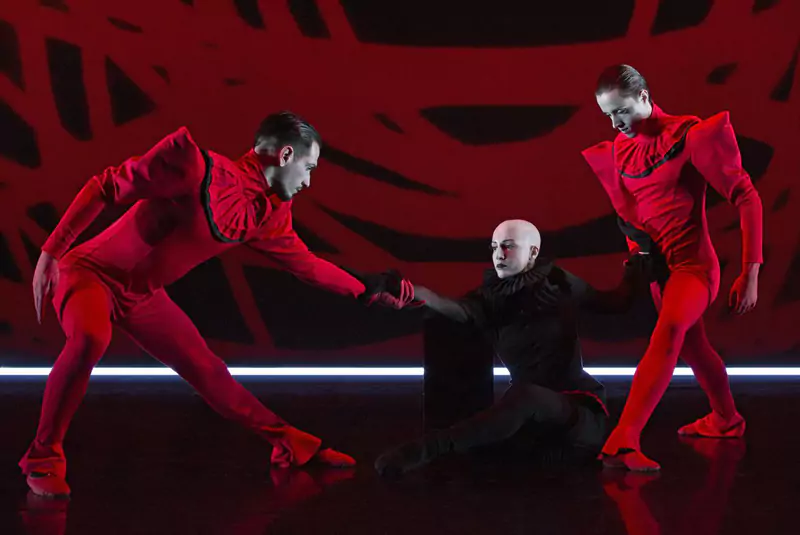
Relative Calm.
Photo credit: Lucie Jansch.
In the van on the drive to the hotel, critics commented that it was typical Wilson. “If you’ve seen one of his pieces, you’ve seen them all” was the most negative iteration of this sentiment. There was a view that the piece was “cold” and had failed to touch most of the reviewers. If I had seen it in isolation I might have agreed with them, but for me in the context of the entire festival, it is an important counterbalancing performance piece. It opens up the prospect of finding inspiration in a vision where biological life is not at the centre of existence, and so it anchors us in those ubiquitous physical realities where behavioural laws have to do with gravity, infinity and solar energy, humanity being a mere itsy-bitsy spider that crawls up the drain again … and yet again.
It is unusual to find an artistic director who wants his or her work to be a significant contribution to democratic values. The festival artistic director Rodrigo Francisco has always been special in that he unabashedly asserts that his affiliation with the political left derives from a personal identification with the working class which, for him, has a specific set of difficulties and ambitions. The interview with him (my third) which is associated with this article and which took place during the festival, reveals that he is now a member of Portugal’s Communist party.
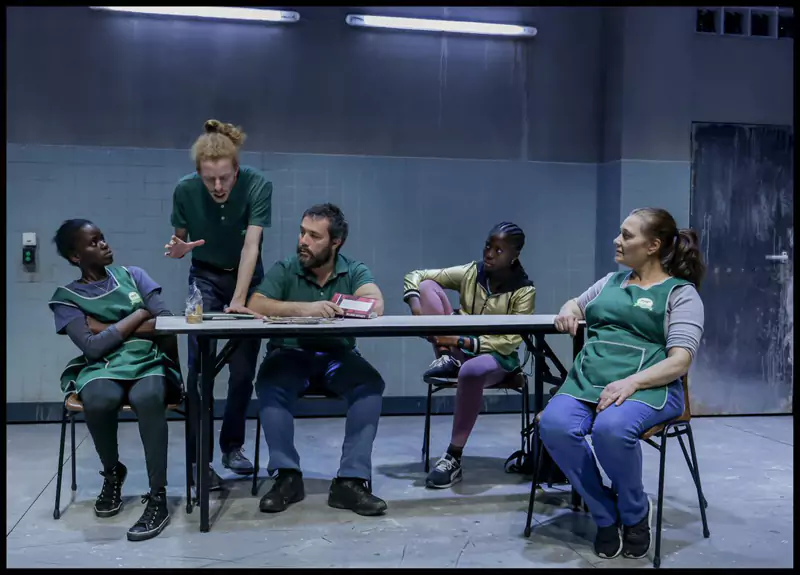
Além Da Dor.
Photo credit: Rui Mateus.
So, when I heard he had directed the British play Beyond Caring by Alexander Zeldin (2014) – it is an in-yer-face drama about cleaners in a factory and their imposing bosses – I was determined to see the production. (The play has similarities with Skeleton Crew by the American writer Dominique Morisseau currently playing in London.) I was unfamiliar with Beyond Caring; the production (entitled Além Da Dor) was in Portuguese and there were no surtitles into English. How could I sensibly attend? Francisco himself offered the solution by handing me the play in its English original which I read right up to minutes before the performance began and thanks to which I was able to follow events on the Experimental Stage of the Joaquim Benite theatre.
It is said that Zeldin’s play is about the “invisible” people in our society; those who keep showrooms, factories, offices and hotels clean when we are not there. In Além Da Dor, directed by Rodrigo Francisco, newly-hired meat processing factory cleaners are female: two young professional Portuguese actresses who have African origins, and the third is a middle-aged white woman who needs money to support her family. (The actresses are Binete Undonque, Djucu Dabó and Maria Frade). The men are the boss (Ivo Marçal) who is brazen and posturing, and a long-haul regular worker (Pedro Walter known as Phil) who is laid-back and given to reading in the toilets. Although Phil is also only a worker, he enjoys privileges because he is a man extended to him by the boss and as well from the women who are subservient by nature.
The realistic set (designer Céline Demars) runs the length of the stage and represents the recreation room where the workers retreat for breaks, replete with a coffee machine that takes money more often than it yields drinks, shelves of cleaning materials (which give off ammonia-like odours into the audience from time to time) and automatic doors that lead into the factory proper. There, during their long middle of the night shift, the workers converse, rest or discuss procedures.
At every scene change in Além Da Dor, the size of the recreation room becomes smaller. The wall separating it from the factory proper is squeezed into an increasingly narrower band so that the place of work inexorably encroaches upon the time-off area. The workers are being robbed of their identity, and additionally the women’s proficiency as cleaners is forever questioned even within the walls of the recreation room by their boss. The rhythm is slow, implying a sameness to their nights and a boredom with their routine. But friendship develops among them, and in a fantastically dense climax, one of the cleaners (Grace, played by Dabó) pounces on Phil, and they make love in a desperate attempt at liberation from the ponderousness of their seemingly endless nights. Her soft sobbing afterwards communicates the tragedy of being young and needy, full of life but restricted in expectations. It is a touching portrayal of a menial existence that most people dread but that is often the only option for immigrants, the poorly-educated or poor, or those who do not have a command of the country’s language. The camaraderie we see reveals that there is still a vitality to that kind of existence, but the sobbing reminds us that there is also an undeniable tragic element as well.
The audience was pleased with the socially critical element of the production and clapped strongly. I overheard one critic saying that instead of total silence there would have been a fan humming away, even if all the factory machines had been turned off while they were being disinfected.
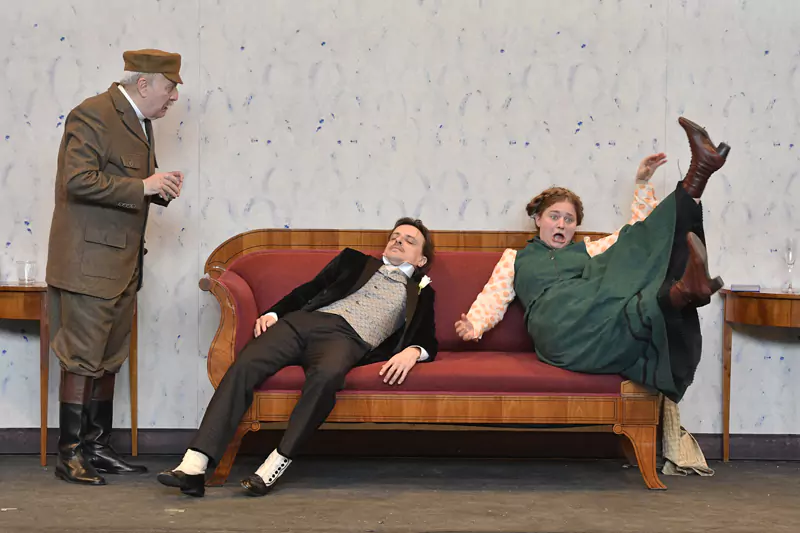
“The Marriage Proposal.”
Photo credit: Tommaso Le Pera.
Everyone I spoke with chose Peter Stein’s production of three short Chekhov plays – The Bear, The Dangers of Tobacco and The Marriage Proposal – as their favourite in the mid-festival period when most of the international productions were being staged. A co-production between the Tieffe Teatro Milano and Teatro Biondo di Palermo, the show kept its Italian title: Crisi di nervi. Tre atti unici di Anton Čechov (Nervous Breakdown, Three One-Act Plays by Anton Chekhov). Stein’s was an evening of old-fashioned theatre – light on directorial manipulation and heavy on dramaturgical insights. One could almost hear the public collectively sigh with relief to be entertained by a playwright and not by a clever director. It was an evening of Chekhovian slapstick and belly jiggling laughter, onthe large stage of the Teatro Joaquim Benite that seats 442.
The evening started with the play Chekhov himself called vaudevillian that features Stein’s wife, the Italian actress Maddalena Crippa. In The Bear, Crippa plays the faithful widow just under over-the-top, the sense of realism kept alive by the evidently Catholic beliefs supporting her flamboyant style of mourning and also because she wears a typical black mourning dress, veil and gloves from the late 1800s (costumes Anna Maria Heinreich) and has isolated herself in the room where the wake must have been held as evidenced by the number of chairs lining the walls of the room (scene design Ferdinand Wögerbauer). Of course, her declaration to her old and rickety servant (Sergio Basile) that she intends to mourn her husband properly to show herself superior to her husband, an adulterer, is a laugh line that clues us into the staged quality of her grief. When a man who comes to collect a debt (Alessandro Sampaoli) grows to admire her spunk and fall in love with her, it comes as no surprise that she reciprocates even if she insultingly called him a “bear” just minutes earlier.
The Dangers of Tobacco is a farce that features an anxious man with asthma who confesses to being dominated by a tyrannical wife – contradicting the stereotype that men dominate women. In the light of the loss of human rights worldwide presently, the play is eerie rather than funny. Gianluigi Fogacci plays the henpecked husband in a worn-out tailcoat who strays from the subject of a lecture his wife ordered him to give on the dangers of tobacco to complain about his wife’s abuse, but fear runs deeply in him and as soon as his wife appears, he switches into lecture mode.
Stein’s hand as a director is most evident in A Marriage Proposal, which is not as simple as the situational comedy of the earlier pieces. The short play is complicated in that the character of the suitor and the potential fiancée are both odd – if not, in Stein’s interpretation, neurotic. The principal character Ivan Vassilevitch Lomov not only gets himself into a ridiculous situation by proposing to a neighbour landowner’s daughter with whom he feels no natural affinities, but he is marred by a series of personality disorders befitting a Molière character.
The problems include anxiety and hypochondria. Natalya (Emilia Scatigno) who receives the proposal launches into a furious argument with Lomov; she stakes a claim to a field Lomov insists he owns and far prefers her family’s dog to Lomov’s. Farcically, neither views the proposed marriage as a union that would make the two contiguous farms into one estate. And yet, as Natalya twists and turns on stage like a wind-up doll, it is clear that her body yearns for Lomov who, meanwhile, bemoans his physical aches which are all imaginary. Unconvincingly, Natalya’s father considers their bitter arguing to be typical of betrothed couples but he is simply overjoyed to think that he can finally marry his daughter off.
My experience with the most intellectual performance of the festival (during the days I was there), Entrelinhas (Between the Lines), began a day ahead of its performance when I had a chance encounter with the playwright Tiago Rodrigues, the present artistic director of the Festival d’Avignon, and the versatile solo actor in the play, Tónan Quito.
I asked if there would be surtitles in English. None were planned but they did indeed have them. Although it would be an additional technical effort, they promised to include the English surtitles for my benefit. Such is the privilege of a theatre critic, and I felt honoured. But when the following afternoon came around, I was tired and did not assert myself when the young usher directed me to a loft where glare obscured the surtitle screen! Such are the reversals of the best laid plans of men and women. All I can tell you about is the contours of the production.

Tónan Quito in Entrelinhas.
Photo credit: Axel Hörhager.
Quito’s vocal versatility brilliantly created multiple personalities on stage, for indeed Entrelinhas is a play with a series of overlapping stories, some of which are real and others fictional. The drama, which is delivered with virtually no action as a lecture, begins with the fact that Tiago Rodrigues owns a copy of Oedipus by Sophocles that had been in a prison library, and a prisoner had written a letter to his mother and placed it between the pages of the book where Rodrigues found it. In the letter, the prisoner draws parallels between his personal family tragedies and the Greek drama. Simultaneously, the play is about the playwright failing to meet a deadline for the completion of the play, and meanwhile he goes blind; the actor seeks him out and cannot find the playwright at his home or anywhere else for that matter.
The audience has been handed a programme for Entrelinhas that reproduces the words from Oedipus and lines from the prisoner’s letter in couplets, and there is no doubt about the literary quality of the writing. The audience applauded with great enthusiasm. My impression is that the play is experimental, a work in search of a dramatic form, and for me this is its great achievement. I recollect Puur by the Opera Ballet Vlaanderen that I reviewed recently and which is also experimental, and suddenly I understand that theatre has finally left the long claustrophobic tunnel of Covid and its streamed shows. Theatre is vibrant and attempting to find new forms appropriate to the Zeitgeist once more!
An interview with Rodrigo Francisco and a transcript of the lecture given by Irish playwright Enda Walsh whose play Medicine was performed at the Almada Festival 2024 under the title Remédio will follow as adjuncts to this diary review.



